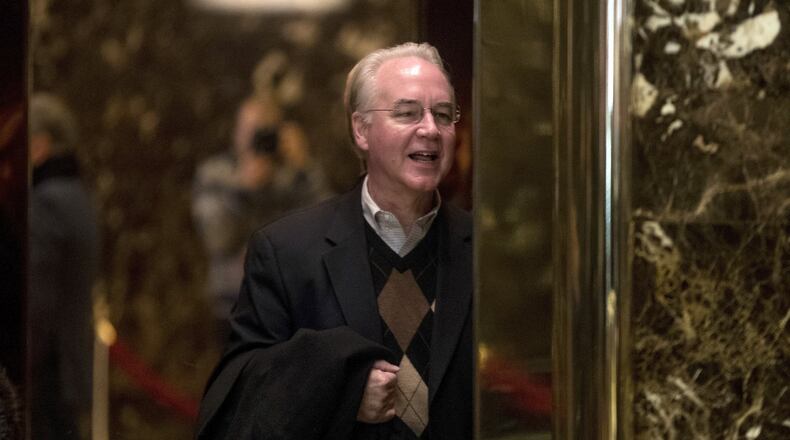U.S. Rep. Tom Price, the Roswell doctor tapped by President-elect Donald J. Trump to oversee Medicare, Medicaid and the dismantling of Obamacare, has advanced policies favorable to the health care industry throughout his two-decade political career.
And the industry in kind has donated millions of dollars in campaign contributions to help fuel his political rise from state senator, to chairman of the powerful House Budget Committee in Congress, to pivotal cabinet appointee in Trump’s administration, according to an Atlanta Journal-Constitution analysis of his record.
But it's his investments in the health care, insurance and pharmaceutical industries, including hundreds of thousands in stock trades during the past four years that has turned his confirmation process for Secretary of the U.S. Department of Health and Human Services into one of the most contested of the incoming administration. Hearings are scheduled to begin Jan. 18.
Senior Senate Democrats have called for an ethics investigation and a delay to his nomination process because of revelations, first reported by The Wall Street Journal, that Price traded more than $300,000 of stock in about 40 health-sector companies since 2012. Critics have said legislative decisions made by Price could have affected those stock prices and created potential conflicts of interest. Price's influence in shaping health legislation includes more than 36 bills sponsored or co-sponsored during the last session.
Price, who declined interview requests, said he would also resign from a fiduciary role with a Georgia limited liability corporation, while retaining an ownership stake in that company and two others that earn rental income.
Going forward, Price said he and family members, including his wife, who serves in the Georgia General Assembly, would not acquire direct financial interest in a wide swath of health and other sectors that fall under the purview of the agency that Price would head.
Elizabeth Fischmann, associate general counsel for ethics at HHS, said his plan would put Price in compliance with ethics laws.
Trump Transition Team spokesman Phil Blando issued a statement to the AJC saying that Price, if confirmed, would obey all rules related to divestiture of holdings in companies regulated by HHS agencies.
“Dr. Price has always complied with all laws, regulations, and disclosure and ethics requirements regarding his financial holdings,” the statement says. “He will continue to do so. If confirmed, he will abide by any divestiture conditions that the Office of Government Ethics may require.”
Price’s defenders say questions about his stock trades while in Congress are a political stunt to weaken the cabinet nominee who figures to be central in helping deliver on Trump’s campaign promise to repeal and replace the Affordable Care Act, President Barack Obama’s signature health care law commonly known as Obamacare.
The American Medical Association has endorsed Price’s nomination, saying the congressman is “a leader in the development of health policies to advance patient choice and market-based solutions as well as reduce excessive regulatory burdens that diminish time devoted to patient care and increase costs.”
Meanwhile, a group of 6,000 physicians calling themselves the Clinicians Action Network have signed a petition opposing Price because of his vow to help repeal Obamacare.
Democrats signaled this week that they are also likely to challenge Price’s statements on privatizing Medicare. Senate minority leader Sen. Chuck Schumer, D-N.Y., charged that Price’s positions were “far to the right” of what Trump campaigned on.
“Will Representative Price stick with what President-Elect Trump said? No cuts to Medicare, Medicaid?” Schumer said. “Or will he pursue his lifelong dream of privatizing and limiting them? We’ll see. But we need answers at hearings before we vote, and the American people are entitled to it.”
Sen. Johnny Isakson, R-Ga., sits on the Health and Finance committees that will hold the confirmation hearings. Isakson said he expects a contentious partisan battle, but thinks Price will survive.
“I think the Democrats will throw everything but the kitchen sink at him,” Isakson said. “The biggest challenge to getting the best minds and the best people in government are the things like what Tom is having to go through right now. He’ll be tougher because of it and he’s the right man for the job and he’s going to get it.”
Credit: Bob Andres
Credit: Bob Andres
Medical groups give most to Price
If campaign contributions are the measure, the health care industry has had a long-term love affair with Price and his policies.
It fueled his first campaign for Congress in 2004 and bet big on Price during that election cycle. The money helped him win a heated primary battle for the House seat vacated when Isakson ran for the Senate.
That year, he collected $946,976 from the health sector, leading all House members and candidates in contributions from health professionals, hospitals, pharmaceutical companies and others in the health sector, according to the Center for Responsive Politics.
Price doubled the total that then-House Speaker Dennis Hastert, the body’s most influential member, received from the industry.
In the 12 years he's been in Congress, the support has grown. Price has raised $4.8 million from the industry over the course of his Congressional career. The exact amount of his support from the industry is unknown because Price has a poor record of identifying his contributors.
The Center for Responsive Politics says that Price has one of the worst records of identifying donors of any member of Congress. Over the two-year 2016 election cycle the center found that more than 13 percent of Price's donations did not include any information about the occupation of the donor. The average for winning congressional candidates was 3 percent, the center said.
Nonetheless, Price consistently ranks in the top five or six House members in terms of contributions from the health care industry each election cycle, according to an AJC analysis of the center’s data.
Dating back to his time in the Georgia Senate, where in 2002 he became the first Republican senate majority leader in Georgia history, he’s blamed frivolous lawsuits for imperiling the nation’s health care system and bringing it to crisis.
He called for tort reform in lawsuits and for capping civil judgment awards that Georgia patients could receive for pain and suffering due to doctor’s mistakes. But his hard-line stance even frustrated some in his own party who blamed him in 2004 for failing to reach a compromise agreement on tort reform that fell apart after his insistence that the bill have a $250,000 liability cap.
Price blamed state House Democrats, but the episode became an issue in his primary race for Congress.
“We don’t have tort reform because a doctor killed it,” former Republican state senator Chuck Clay told a reporter at the time, referring to Price, who was his primary opponent. “They insisted on their way or no way.”
But Price’s stance helped him win thousands of dollars in contributions from medical professionals, out-raising his primary opponents in the GOP district that he went on to win.
Price active trader in medical stocks
In Congress, Price is the 50th richest member, with a net worth is estimated at $7.2 million, according to a 2015 ranking by Roll Call. He is heavily invested in mutual funds, but has become more active in trading stocks during the past four years, according to an AJC analysis of his financial disclosures.
Last year alone, Price bought and sold shares in 77 companies — from Facebook and Amazon to Delta Airlines and Foot Locker.
But Price’s trading of health care related stock has caught the attention of Senate Democrats.
Since 2012, Price has made more than 40 stock transactions of companies involved in health care or insurance, while serving on a health panel for the Ways and Means Committee.
Most of those transactions were in the $1,000 to $15,000 range, including investments in insurance giant Aetna, and big pharma companies Bristol Myers and Eli Lilly, the AJC analysis found. The most controversial are his investments in Innate Immunotherapeutics, an Australian biotechnology company that researches new treatments for autoimmune diseases.
Price invested a total of $10,000 in three separate purchases of the stock in January 2015, then invested between $50,000-$100,000 in August — two days after Rep. Chris Collins, R-NY, bought four million shares of the company valued at between $500,000 and $1 million.
Members of Congress can buy and sell stocks, but can’t use insider knowledge when making investment decisions, said Richard W. Painter, a law professor at the University of Minnesota who served as the chief ethics lawyer for President George W. Bush and his staff from 2005-07.
Painter said as secretary of HHS, Price would have to sell stock owned in any company regulated by the various agencies under the department, actions Price pledged to take in his Jan. 11 letter to the HHS ethics officer.
Price listed Innate Immunotherapeutics as one of the 40 companies that he would divest from if confirmed as HHS secretary. He also pledged to divest from all his pharmaceutical company holdings, including Bristol Myers and Eli Lilly.
In Price’s case, however, Painter said there was the lingering question of whether Price benefited from insider information in his acquisition of Innate Immunotherapeutics and other health care related companies.
“If he were in possession of material, non-public information and traded with that in his possession, that would be a criminal offense. That’s insider trading,” Painter said. “If I were on the nominating committee, I wouldn’t vote to confirm until I heard the SEC was satisfied that there was no use of non-public information, or no reason to believe there was.
“I’d want to know you won’t have a situation where he gets confirmed and then another shoe drops and you’ve got an HHS secretary under an SEC investigation.”
Credit: Curtis Compton
Credit: Curtis Compton
Controversial health care proposals
If he is confirmed as HHS secretary, Price will oversee a trillion-dollar bureaucracy with 80,000 employees who work for agencies that include the Food and Drug Administration, the National Institute of Health, the Administration for Children and Families, and Atlanta's own Centers For Disease Control and Prevention.
He would be the second Georgian to head the HHS department — created during the Eisenhower administration — and just the third physician to do so. The most recent doctor serving as HHS secretary was Atlanta’s Louis W. Sullivan, who held the job in George H. W. Bush’s administration.
Price will have a powerful perch alongside Trump in the coming debate over replacing the Affordable Care Act and potential changes to entitlement programs.
He has been a vocal supporter of a Republican push to privatize Medicare, saying on Nov. 17 that Congress would look to make changes to the program in 2017.
And with all the political infighting over health care during the Obama years, Price is one of the only members in Congress to draft legislation offering an alternative to Obamacare. Price introduced his “Empowering Patients First Act” in 2009, and has re-filed updated versions in every session since.
It calls for a mix of tax credits and deductions so individuals could buy insurance in the private market. It would increase use of health savings accounts, provide interstate insurance options, roll back Medicaid expansion and create high-risk pools for people with pre-existing conditions.
One projection says Price’s plan would save taxpayers money, although critics contend it would cause millions to lose their insurance and would not adequately fund coverage for millions of others.
Limiting patient rights to sue
Tort reform, what Price calls “lawsuit abuse reforms,” is also one of the cornerstones of his plan to replace Obamacare.
Price’s proposal includes a plan to shift the burden of proof in lawsuits by creating treatment guidelines created by doctor groups that would provide a safe harbor defense in lawsuits. It would also create health courts to set up an administrative process to resolve disputes.
If such proposals were adopted at a national level, they would shift the balance of power within the system that has held the medical profession accountable when it makes mistakes, according to Maxwell J. Mehlman, a professor at Case Western Reserve University School of Law who has studied tort reform efforts for decades.
“It’s a disaster for patients,” Mehlman said. “This effort by people like Price would simply kick that whole thing over. We would have a medical profession basically controlling itself without very much oversight.”
Supporters of the “Empowering Patients First Act” say the plan would curtail the government’s role in health care decisions by patients and doctors, lower the cost of care and improve quality. Critics say insurance premiums may go down for younger and healthier Americans, but those who are older and sicker could pay more.
“All the replacement plans that I’ve seen to date, including this one, roll back the clock to where we were before the ACA,” said Gerald Kominski, a health policy professor at UCLA and director the school’s Center for Health Policy Research. “And it reintroduces some of the problems and major shortcomings that existed in the marketplace before that law was passed.”
Price has declined interview requests since Trump announced his nomination on Nov. 29. But in a 2015 interview with the right-leaning Opportunity Lives talk show, Price said he wants to “equalize” the purchase of health coverage in the private market with employer-based coverage. He said allowing purchase of insurance with pre-tax dollars will, over time, allow people to find better deals than can be provided in their workplace.
“We say every single American ought to have the ability to buy the coverage that they want for themselves, not what the government forces them to buy,” Price said in the interview. “We’re moving toward a system where the federal government defines every single thing about … Americans’ health care. If you think something is health care that the federal government doesn’t think is health care, the federal government always wins.”
Timeline: Tom Price's political career
1996: Elected to Georgia State Senate representing the Roswell area.
2002: Re-elected to his fourth term in the state Senate and becomes the first Republican Majority leader in Georgia history after the GOP wins control of the chamber.
2004: Elected to Congress representing the 6th U.S. House district serving Atlanta's northern suburbs. The seat was formerly held by Johnny Isakson and Newt Gingrich.
2009: Introduces the "Empowering Patients First Act" as an alternative to President Obama's health care proposal. He re-introduces the bill each Congressional term during Obama's presidency.
2015: Elected Chairman of the House Budget Committee.
2016: Nominated by President-elect Donald J. Trump Nov. 29 to be U.S. Secretary of Health and Human Services.
2017: Prepares for Jan. 18 Senate confirmation hearing.
Keep Reading
The Latest
Featured






